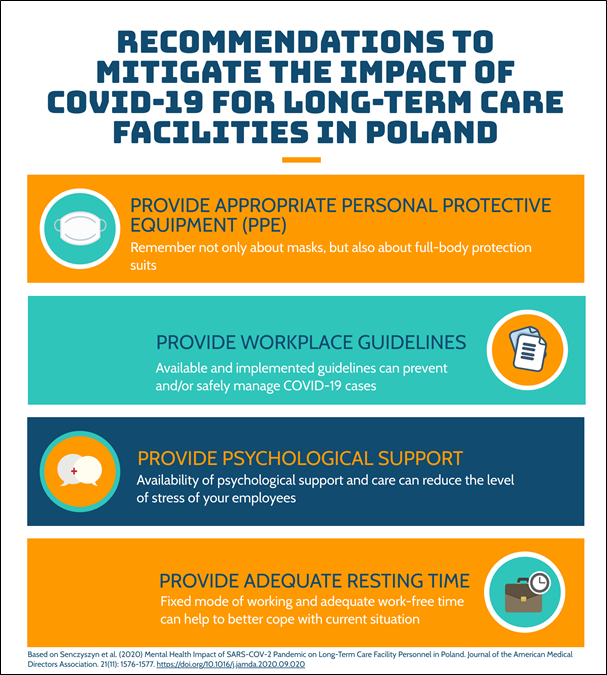Adrianna Senczyszyn, Katarzyna Lion, Dorota Szcze?niak, Joanna Rymaszewska, El?bieta Trypka, Justyna Mazurek, Marta Ciu?kowicz, Maria Ma?kowiak
The COVID-19 pandemic has a disproportionate impact on long-term care facilities (LTCF) residents world-wide. In many countries, more than 40% of COVID-19 related deaths have occurred in long-term care.

Picture source: freepik.com
In Poland, according to the updated recommendations, only LTCF personnel, who are essential for the proper functioning of the facility and who do not show any symptoms of infection, are allowed inside LTC facilities. The activities of residents outside the facilities should be limited to minimum. At the same time, the residents should be able to contact their families and support network outside the facility, e.g. meet with them in a separate room with a plexiglass or glass partition or contact them via communication devices. Volunteers, employees and other people from outside LTCFs should measure body temperature at the entrance to the building. If a person in the facility is suspected of being infected with the SARS-COV-2, it is recommended to notify the general practitioner or the nearest infectious hospital.
Facing this critical situation, LTCF personnel have to cope with overwhelming workload, depletion of adequate personal protection equipment (PPE) and deaths caused by SARS-CoV-2 infections. What is more, LTCF personnel have experienced a fear of contagion and spreading the virus to their relatives, for over six months on a daily basis. They constantly remain in a dilemma between loyalty to people under their care, their professional duties, and concerns for their own families. All of these factors could contribute to the mental burden, burnout, and increased chance of depression, anxiety and post-traumatic stress disorder development.
Therefore, in our recent study, we aimed to provide a window on psychological consequences (somatic symptoms, anxiety and insomnia, social dysfunction, and depression) associated with the exposure of long-term care facilities employees to the risk of the SARS-CoV-2 contagion in Poland. Moreover, we investigated if institutional factors, such as PPE availability, safety guidelines or access to psychiatric and psychological support at the workplace, contribute to the decrease of psychological distress of the long-term care facilities personnel. We collected data through an anonymous on-line survey (May-June 2020) among personnel of Polish LTCF. The survey consisted of three sections: (1) the sociodemographic section, (2) the authors’ questionnaire with questions related to COVID-19 (3) and the General Health Questionnaire (GHQ-28).
Our study showed the importance of institutional factors of LTCF on the mental health of employees. We have created an infographic which illustrates recommendations for long-term care facilities in Poland based on the outcomes of our study. Those are especially important as similar outcomes were also published in a recent global study by Morgantini et al.

AUTHORS:
Adrianna Senczyszyn (@AdaSenczyszyn), Department of Psychiatry, Wroclaw Medical University, Poland
Katarzyna Lion, PhD (@KatarzynaLion), Menzies Health Institute Queensland, Griffith University, Australia
Dorota Szcze?niak, PhD, Department of Psychiatry, Wroclaw Medical University, Poland
Prof Joanna Rymaszewska, MD, PhD, Department of Psychiatry, Wroclaw Medical University, Poland
El?bieta Trypka, MD, PhD, Department of Psychiatry, Wroclaw Medical University, Poland
Justyna Mazurek, PhD, Department and Division of Medical Rehabilitation, Wroclaw Medical University, Wroclaw, Poland
Marta Ciu?kowicz, MD, Department of Psychiatry, Wroclaw Medical University, Poland
Maria Ma?kowiak, Department of Psychiatry, Wroclaw Medical University, Poland
